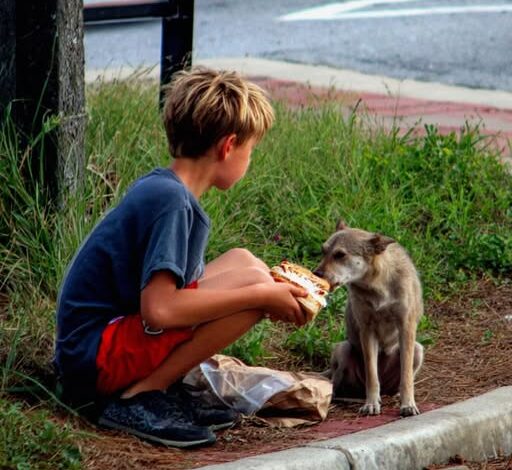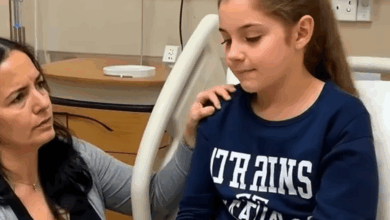
My Son Shared Half His Lunch with a Stray Dog Every Day – Until a Red SUV Stopped Beside Him
My name’s Brooke, I’m 37, and I’ve been raising my son Eli on my own for seven years in a small town that’s equal parts charm and rust. I work double shifts at Millie’s Diner — the kind of place where the coffee’s always burnt, the floors always squeak, and old men named Hank come in at sunrise to talk about fishing but never actually go fishing.
It’s not glamorous, but it’s a life.
Eli’s ten now. Quiet kid, gentle heart, the kind who waves at garbage collectors and thanks the bus driver every morning. Once, I watched him stop mid-walk to flip over a beetle stuck on its back.
“Everyone deserves help, Mom,” he said.
That’s just who he is.
It started in spring — the kind of weather where the air smells like thawing earth and possibility. I noticed the peanut butter disappearing faster than usual. Bread too. At first, I figured he was just growing, but something didn’t add up. His lunchbox came home spotless every day, not a crumb left. Eli’s not the type to finish his apple slices, let alone clean the thing out completely.
Then one Tuesday, I got off my shift early. I decided to walk home and maybe grab Eli from school. On my way, I cut through the alley behind the old hardware store — the one with the peeling red siding and a fence that’s given up on standing straight.
That’s where I saw him.
Eli was crouched near a rusted dumpster, unzipping his backpack. He pulled out a sandwich, tore it in half, and set one piece carefully on the ground. From under the dumpster, a scrappy little dog crept out — ribs showing, fur matted, tail wagging weakly.
“Hey, buddy,” Eli whispered. “I saved you some.”
The dog gulped it down and wagged harder, like Eli was his entire world. My boy poured water into the wax paper, slid it over, and said, “Don’t forget to hydrate.”
I stood frozen, half hidden behind the fence, my throat tight.
That night, I didn’t confront him. I just packed a little extra — another sandwich, a slice of apple pie, and a jar of honey. The next morning, he looked at the lunchbox and gave me a knowing little smile. “Thanks, Mom.”
After that, it became their routine. Every afternoon, Eli and the dog — who he later named Buddy — met behind that store. I’d pass by sometimes and catch them sitting together like old friends. Buddy’s tail wagged the second he saw Eli coming.
It didn’t stay secret for long. Small towns never keep secrets.
At the grocery store, I overheard two women whispering near the canned goods. “That Turner boy’s been feeding strays again.” “Sweet, but odd,” the other said.
Let them talk.
Then the teasing started at school. Kids called him “Dog Boy,” barked at him in the halls. When he told me, I offered to speak to his teacher, but he shook his head.
“They laugh, but Buddy doesn’t care,” he said simply.
That night, I packed even more food. “In case Buddy brings a friend,” I said. Eli grinned. “You’re the best, Mom.”
And then one afternoon, everything changed.
A teenage girl walking home saw Eli and Buddy behind the hardware store. The late sun caught them just right — my boy handing a sandwich to that skinny dog like it was a sacred ritual. She took a picture and posted it online.
By morning, it was everywhere. “Faith in humanity restored,” one comment read. Another said, “Whoever this kid is, he’s proof the world isn’t all bad.”
The diner buzzed with it. Regulars pulled out their phones to show me the photo. When I told them that was my son, they nearly cried.
Eli just shrugged. “Buddy doesn’t care about Facebook, Mom. He just likes sandwiches.”
A few days later, I left work early again. I wanted to walk home with him, maybe grab milkshakes. But as I turned the corner, I saw a red SUV parked near the alley — brand new, polished, completely out of place.
A tall man in a gray suit stood beside it, watching Eli and Buddy. Something about his stillness set my nerves on edge. I crossed the street fast.
He turned as I approached, eyes locked on the dog. His face went pale. “Shadow?” he whispered.
Buddy froze mid-bite. Then, tail trembling, he bolted toward the man, whining, pawing, losing his mind with joy.
The man fell to his knees. “Oh God,” he breathed, cupping the dog’s face. “It’s really you.”
Eli looked at me, confused. “Mom, he knows Buddy.”
The man straightened, wiping his eyes. “I’m sorry,” he said, voice thick. “My name’s Richard Hollis. That dog — Shadow — he belonged to my son. My boy died two years ago in a car accident. After the funeral, Shadow ran off. We searched everywhere.” He paused, swallowing hard. “A friend sent me that picture online. The way your son sat with him… it looked just like my son. I had to come.”
Silence. Even the wind seemed to stop.
Finally, Richard crouched again, patting the dog’s back. “I’ll take him home now.”
But Buddy didn’t move. Instead, he turned away from Richard, padded back to Eli, and sat beside him.
Eli stroked his fur. “He doesn’t want to go. He’s happy here.”
Richard’s jaw tightened. “He’s my son’s dog. He belongs with me.”
Eli looked up, calm but steady. “He doesn’t care who he belongs to. He just wants someone who stays.”
Something in that man cracked. His shoulders sagged. He knelt, whispered something into the dog’s ear, and left.
Buddy stayed.
That night, I caught Eli packing an extra sandwich and scribbling something on a napkin. The next morning, the red SUV was parked by the fence again. Under its windshield wiper sat the sandwich, wrapped carefully, with a note:
He likes it with honey. Please don’t be mad if he follows me tomorrow. — Eli
Three days later, the SUV pulled into our driveway. Richard stepped out — this time in jeans and a flannel shirt, looking human instead of haunted. Shadow wagged wildly in the passenger seat.
“Your son was right,” he said. “Shadow didn’t just find another owner. He found another family.”
He handed me a manila folder. “I’m starting something in my son’s name — a rescue foundation. I want to build it here. And I’d like Eli to help.”
When Eli burst out the door and saw the dog, he ran full tilt. Shadow leapt into his arms like he’d been waiting for it all along.
Richard smiled. “Guess that’s your answer.”
That summer, they built the shelter together — an old barn turned bright and alive. They called it Michael’s Haven, after Richard’s son. Eli painted kennels and fed strays. Richard taught him to use tools. Together, they brought forgotten animals back to life.
At the grand opening, Richard gave a short speech beside Eli and Shadow. “This place exists because one boy shared what little he had,” he said. “Kindness doesn’t need money — just a willing heart.”
He placed a hand on Eli’s shoulder as the crowd clapped. Then they planted a small oak tree by the gate. The plaque beneath it read:
For Michael — proof that love never ends. It just finds new hands to hold it.
Years later, the tree is tall, shading the kennels where rescued dogs nap. Eli’s in middle school now, busier but still riding his bike out to Michael’s Haven every weekend. Richard visits every Saturday, flannel shirt and all, hauling food, blankets, and stories.
Sometimes after my shift, I pass by and see them — a man, a boy, and an old dog — framed by the light from the barn door.
And I think about that first sandwich. That small, simple act of kindness that turned strangers into family.
I used to worry I couldn’t give my son much. But it turns out, the best thing I ever packed in his lunchbox was love.




